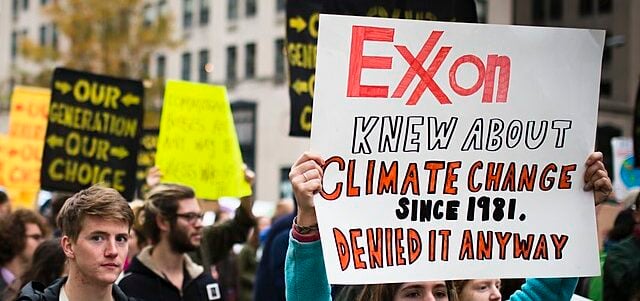
ExxonMobil sues the Netherlands over gas field closure
ExxonMobil is suing the Netherlands under the Energy Charter Treaty (ECT). The multinational disagrees with the decision that gas production in the Dutch province of Groningen will be shut down early. On 30 September, the oil and gas company filed a claim with the International Centre for the Settlement of Investment Disputes (ICSID) in Washington.
“For sixty years, ExxonMobil has profited from gas extraction in the Netherlands, resulting in earthquakes and damages to homes. This has disrupted the lives of many Groningers, but the companies that caused this damage are dodging damage repairs. That ExxonMobil is now filing a claim for losses shows a total lack of moral sense.
In 2018, ExxonMobil and the Netherlands agreed to end gas production by 2030. The Dutch government then decided to shut down the Groningen site sooner, to ensure the safety of people living in the region. ExxonMobil now argues(opens in new window)
that this closure violates the contractual obligations of the Dutch state and that the measures disadvantage the company ‘arbitrarily’ and ‘disproportionately’.
ExxonMobil is filing the claim under the ECT, a controversial treaty that protects foreign investors in the energy sector. ExxonMobil is suing the Netherlands through a Belgian investment company, which gives the dispute an internal EU character.
In 2021, the European Court of Justice ruled that such ‘intra-EU disputes’ based on the ECT are not compatible with European law. Last year, Germany's highest court confirmed this and declared another intra-EU ECT case inadmissible (RWE against the Dutch state - ed.)
ExxonMobil's claim follows another claim that the company filed against the Dutch state together with Shell, earlier this year. Dutch government officials confirm that this new claim shows a lot of similarities with the existing claim.
The number of compensation claims by oil and gas companies under investment-protection clauses is increasing worldwide. As a result, governments might become reluctant to adopt new climate policies. Trade and investment treaties with investment protection like ISDS are major obstacles to climate action and human rights protection. The European Union therefore decided to leave the ECT(opens in new window)
. However, this decision will not take effect until next year.
“As governments take stricter measures to meet climate and environmental targets, oil and gas companies are only trying to save their own skin. With ISDS, these companies have a powerful tool to block or weaken necessary climate policies, or to pass on the costs to society as a whole. That makes ISDS a roadblock to a just transition and it should be abolished as soon as possible”, said Bart-Jaap Verbeek.Do you need more information?
-

Bart-Jaap Verbeek
Researcher
Related news
-
 Civil society organisations push for transformative global investment rulesPosted in category:News
Civil society organisations push for transformative global investment rulesPosted in category:News Bart-Jaap VerbeekPublished on:
Bart-Jaap VerbeekPublished on: -
 The Counter: strengthening the fight for climate justice around the worldPosted in category:Long read
The Counter: strengthening the fight for climate justice around the worldPosted in category:Long read Luis ScungioPublished on:
Luis ScungioPublished on: -


